
GEOGRAPHY
Scope & Guideline
Exploring the Nexus of Earth and Society
Introduction
Aims and Scopes
- Environmental Geography:
Exploration of environmental issues such as climate change, sustainability, and adaptation strategies, emphasizing the role of geography in addressing global challenges. - Geography Education:
Focus on innovative teaching methods and curriculum development for geography education at various levels, integrating critical and sustainable practices. - Cultural and Social Geography:
Examination of the interplay between culture, society, and geography, including race, identity, and the impact of social issues on spatial dynamics. - Technological Integration in Geography:
Investigation of the role of technology in geography, including digital tools, virtual reality, and data analysis in enhancing geographical understanding. - Geopolitical Studies:
Analysis of geopolitical dynamics and their implications on geography, including case studies on conflict, cooperation, and international relations. - Fieldwork and Practical Applications:
Promotion of fieldwork methodologies and practical applications of geographical knowledge in real-world contexts.
Trending and Emerging
- Climate Change and Sustainability Education:
An increasing focus on integrating climate change education into geography curricula, emphasizing the importance of teaching sustainability and adaptation strategies. - Decolonial Perspectives in Geography:
Emerging discussions around decolonizing geography education and research, critiquing traditional narratives and advocating for inclusive approaches that recognize diverse perspectives. - Digital and Technological Innovations:
A noticeable trend towards the use of digital tools and technologies in geographical research and education, including virtual reality and data visualization techniques. - Social Justice and Geography:
Growing attention to themes of race, racism, and social justice within geographical contexts, examining how these issues intersect with geographical education and practice. - Community Engagement and Participatory Research:
An emphasis on involving communities in geographical research and education, promoting participatory approaches that empower local voices and knowledge.
Declining or Waning
- Traditional Economic Geography:
There appears to be a reduction in the focus on classical economic geography themes, such as industrial location and economic development models, as newer interdisciplinary approaches gain traction. - Geographical Determinism:
The exploration of fixed geographical determinism seems to be waning, with increasing interest in more nuanced and dynamic understandings of human-environment interactions. - Historical Geography:
Research specifically centered on historical geography has diminished, possibly overshadowed by contemporary issues like climate change and social justice.
Similar Journals
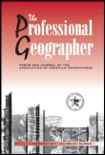
PROFESSIONAL GEOGRAPHER
Where Geography Meets Impactful Research and CollaborationPROFESSIONAL GEOGRAPHER is a prominent journal in the fields of geography and earth-surface processes, published by Routledge Journals, Taylor & Francis Ltd. With a rich history dating back to 1949 and continuing through 2024, it serves as a vital platform for researchers, professionals, and students to explore and disseminate groundbreaking research and insights within the geographical sciences. The journal holds a respectable impact factor, placing it in the Q2 quartile for both Earth-Surface Processes and Geography, Planning and Development as of 2023, highlighting its importance in these critical academic areas. The journal ranks #273 out of 821 in Geography and Planning and #70 out of 179 in Earth and Planetary Sciences on Scopus, reflecting its robust contribution to advancing knowledge in social sciences. Although it does not currently offer open access options, it still provides invaluable content that influences pedagogy and research in geography. Its comprehensive scope invites a wide range of geospatial topics, encouraging interdisciplinary dialogue and collaboration across the global academic community.

Information Geographique
Exploring the Depths of Geographic KnowledgeInformation Geographique is a prominent academic journal dedicated to the field of geographic information science, published by the esteemed ARMAND COLIN. With its ISSN 0020-0093 and E-ISSN 1777-5876, this journal serves as a critical platform for the dissemination of innovative research, addressing the multifaceted aspects of geography and spatial analysis. Information Geographique aims to foster a deeper understanding of geographic phenomena and promote interdisciplinary dialogue among researchers, professionals, and students. Although it does not currently offer open access options, the journal's rich content encompasses studies that span from traditional cartography to cutting-edge geospatial technologies. Established in 1976, it has played a vital role in shaping the discourse within its field and continues to contribute to the academic community with thought-provoking articles and insightful analyses.
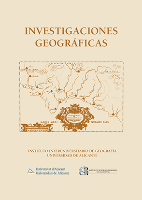
Investigaciones Geograficas-Spain
Empowering scholars to tackle pressing environmental challenges.Investigaciones Geográficas-Spain is an esteemed academic journal published by the Universidad de Alicante, dedicated to advancing the fields of geography, planning, and development as well as earth and planetary sciences. With its commitment to open access since 1983, the journal ensures that research is readily available to a global audience, facilitating knowledge dissemination and collaborative discourse. As reflected in its 2023 Scopus rankings, it holds a commendable position within the Q3 category in both Earth and Planetary Sciences and Geography, Planning and Development, making it a noteworthy resource for scholars and practitioners in these disciplines. The journal's scope encompasses diverse geographical research, aiming to address pressing environmental and societal challenges through empirical studies and theoretical advancements. By contributing to the knowledge reservoir from Spain and beyond, Investigaciones Geográficas-Spain serves as a vital platform for researchers, professionals, and students seeking to enrich their understanding of geographical phenomena.

Miscellanea Geographica
Exploring the Intersections of Geography and SocietyMiscellanea Geographica, published by SCIENDO, is a prominent open-access journal established in Germany that contributes significantly to the fields of Earth and Planetary Sciences and Geography. With an ISSN of 0867-6046 and an E-ISSN of 2084-6118, this journal has been a platform for scholarly dissemination since 1984, encompassing a diverse range of interdisciplinary research areas. Since transitioning to open access in 2011, it has made its content widely available, enhancing visibility for researchers and practitioners across the globe. In the 2023 category quartiles, Miscellanea Geographica is ranked Q3 in both Earth and Planetary Sciences (miscellaneous) and Geography, Planning and Development, reflecting its commitment to quality scholarship. This journal is specifically designed to foster dialogue and collaboration among researchers, professionals, and students, making it a vital resource for those invested in the intricate relationships between geography and societal development. Researchers are encouraged to contribute groundbreaking studies that not only advance academic understanding but also address real-world challenges.
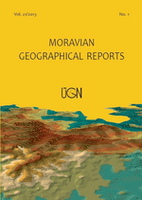
Moravian Geographical Reports
Innovating Dialogue in Geography and Planning DiscoursesWelcome to the Moravian Geographical Reports, an esteemed Open Access journal published by SCIENDO, dedicated to advancing the fields of Earth and Planetary Sciences as well as Geography, Planning and Development. Established in 1993, this journal has steadily built a reputation for disseminating high-quality research, evidenced by its 2023 Q2 ranking in both relevant categories and an impressive Scopus percentile ranking of 72. With a dedicated editorial board and an expanding global readership, the Moravian Geographical Reports serves as a vital platform for researchers, professionals, and students alike, fostering dialogue and collaboration across various dimensions of geographical and environmental studies. Since its shift to Open Access in 2013, it has significantly enhanced the accessibility and reach of its published works, making crucial research findings available to a broader audience. The journal continues to thrive as a significant contributor to the geographical and earth sciences discourse during its converged years from 1993 to 2024.

Geografie
Charting the course for future geographical advancements.Geografie, published by the Czech Geographic Society, serves as a vital resource in the fields of geography, planning, and development. With an E-ISSN of 1212-0014, this esteemed journal has been contributing to the academic landscape since its inception in 1992, providing a platform for rigorous research and diverse perspectives on earth-surface processes and regional development issues. Based in the heart of Prague at Charles University, it has reached an impressive convergence of scholarly excellence, ranking in the Q3 category for both Earth-Surface Processes and Geography, Planning and Development as of 2023. Although it does not currently offer open access, the journal is indexed in Scopus, holding significant positions within its realms—392nd out of 821 in Social Sciences and 89th out of 179 in Earth and Planetary Sciences—indicating its relevance and contribution to ongoing discussions in both disciplines. As an indispensable tool for researchers, professionals, and students alike, Geografie not only enhances the understanding of spatial processes but also fosters innovative solutions for contemporary geographical challenges.

Annals of the American Association of Geographers
Unveiling the Complexities of Our Planet through ResearchAnnals of the American Association of Geographers is a leading academic journal published by Routledge Journals, Taylor & Francis Ltd, and is based in the United Kingdom. With an impact factor positioning it in the Q1 category for both Earth-Surface Processes and Geography, Planning and Development, it stands as a pivotal resource for researchers and professionals in the fields of geography and environmental sciences. The journal’s broad scope accommodates a diverse range of topics, including spatial analysis, environmental change, and human geography, reflecting the dynamic nature of geographical research. Accessible in both print and digital formats, the journal encourages open dialogue and dissemination of knowledge among its authors, readers, and the academic community. As it converges through the years from 2016 to 2024, the Annals continues to showcase high-quality research that influences geographic thought and practice, making it essential reading for students, academics, and practitioners alike.
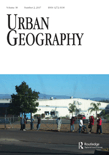
URBAN GEOGRAPHY
Illuminating the Complexities of City LifeURBAN GEOGRAPHY, published by Routledge Journals, Taylor & Francis Ltd, is a leading interdisciplinary journal that has been at the forefront of urban studies since its inception in 1980. With an impact factor that positions it in the prestigious Q1 category in both Geography, Planning and Development and Urban Studies, this journal is recognized for its rigorous research that informs policy and practice in urban environments. With a Scopus ranking of #20 out of 279 in the field of Urban Studies and #79 out of 821 in Geography, Planning and Development, it offers valuable insights for scholars, professionals, and students alike—enhancing our understanding of the complex dynamics that shape urban spaces. URBAN GEOGRAPHY is pivotal for those looking to advance their expertise in urban analytical frameworks, urbanization trends, and sustainable development strategies. Submissions are welcomed from a diverse range of perspectives, making it a vital resource for anyone invested in the future of urban landscapes.

Cadernos de Geografia
Navigating the Future of Geography and Social SciencesCadernos de Geografia is a distinguished biannual journal published by UNIVERSIDADE DE COIMBRA, FACULDADE DE LETRAS, dedicated to the field of geography and related social sciences. With its ISSN 0871-1623 and E-ISSN 2183-4016, this journal has been a prominent platform for the dissemination of high-quality research since it became open access in 2012. Situated in Coimbra, Portugal, it aims to foster academic excellence by providing an inclusive space for innovative studies that explore contemporary geographical issues. Cadernos de Geografia encourages submissions that address diverse aspects of geography, ranging from environmental studies to urban planning, making it an invaluable resource for researchers, professionals, and students alike. As a part of the growing trend in open-access publishing, it enhances the global reach and accessibility of geographical research, thereby contributing to the enrichment of knowledge in the field.
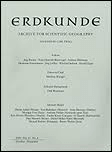
Erdkunde
Navigating the Complexities of Spatial RelationshipsErdkunde is a pivotal academic journal published by the Geographisches Institut, University of Bonn, dedicated to the fields of Geography, Earth and Planetary Sciences, and Ecology. With a history dating back to 1976, this journal serves as a platform for interdisciplinary research and discourse, reflecting diverse perspectives from both theoretical and applied dimensions within these domains. Published in Germany, it currently holds a respectable position within the academic community, classified in Q2 for Geography, Planning and Development and Q3 in Ecology and Earth and Planetary Sciences. Although not an open-access journal, its contribution is significant, offering insights that advance our understanding of spatial dynamics and environmental processes. With Scopus rankings that place it within the median range, Erdkunde is an essential resource for researchers, professionals, and students looking to deepen their knowledge and engage with contemporary trends in geographic research.